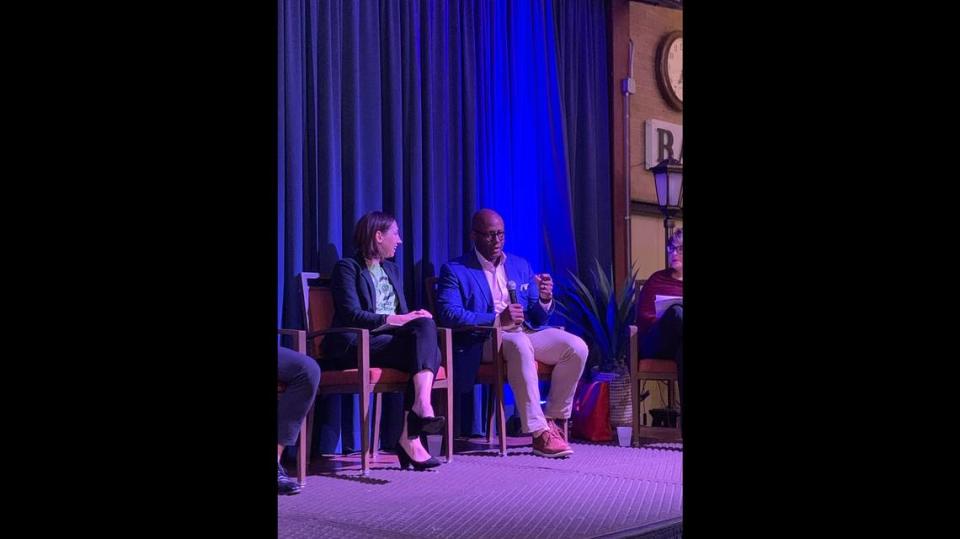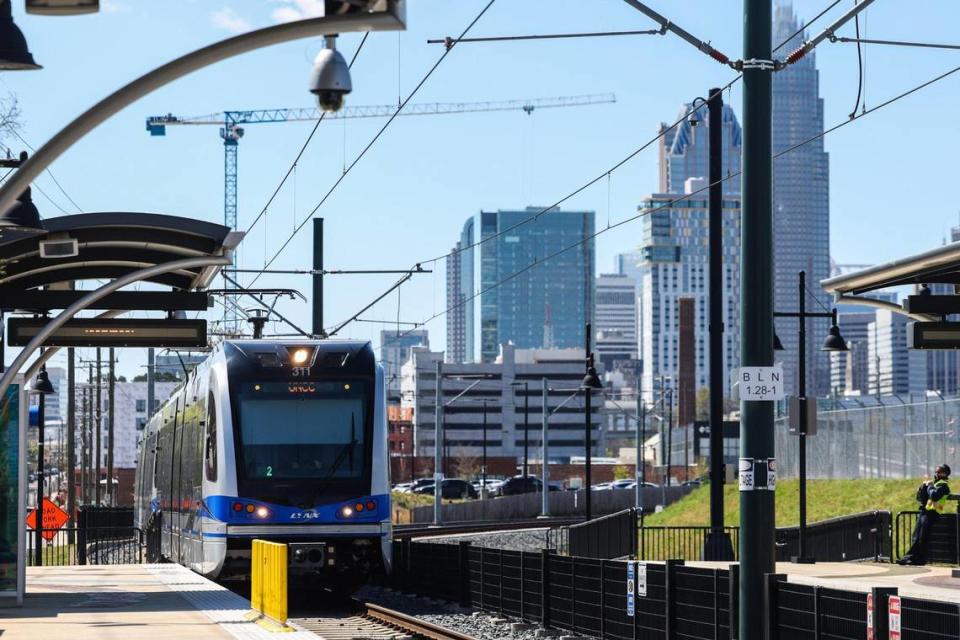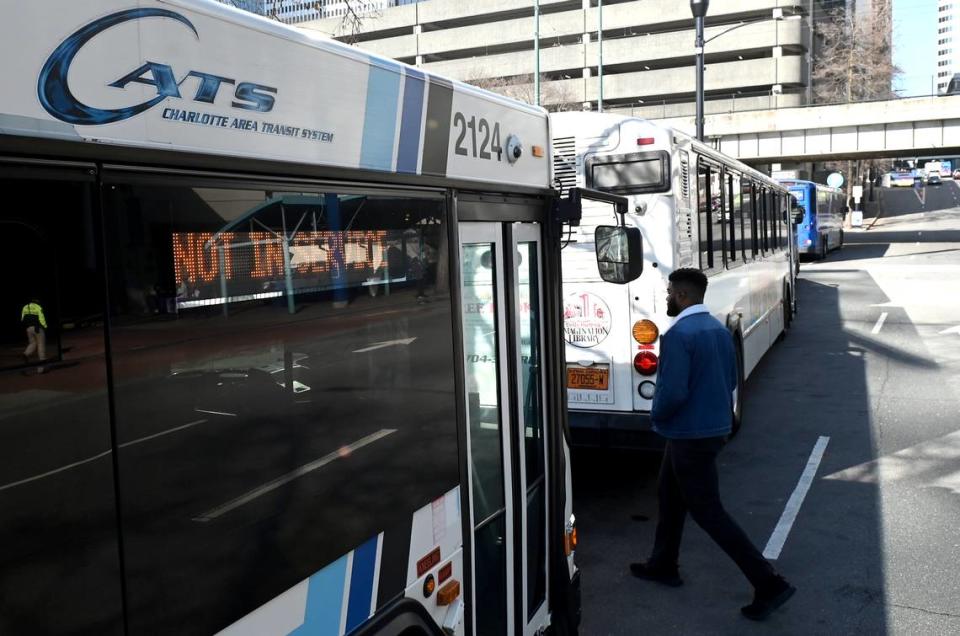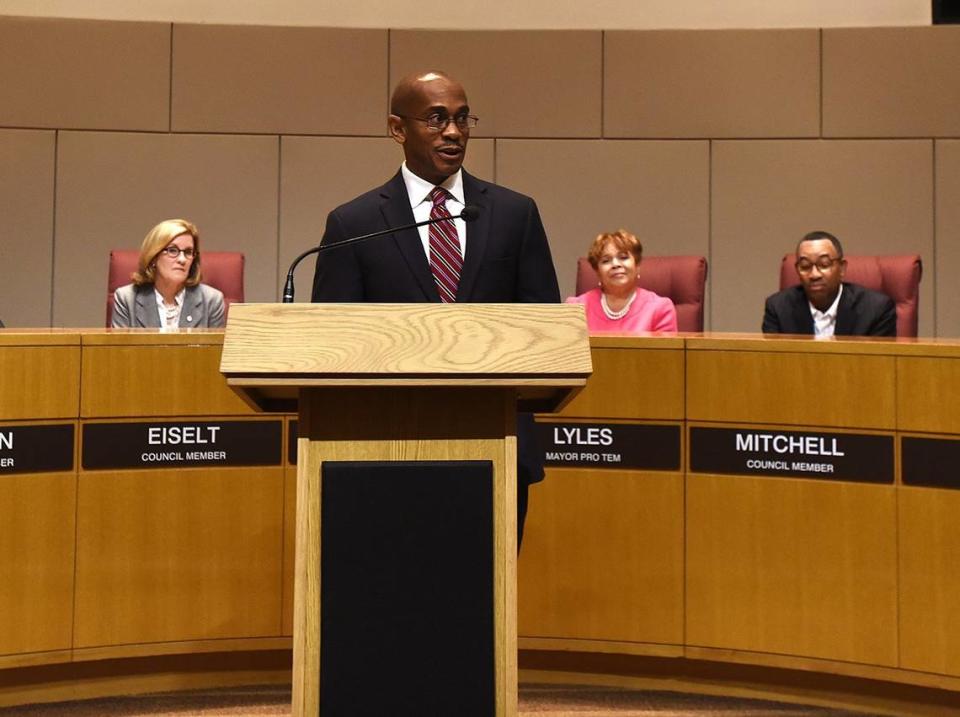Q&A: Former CATS CEO John Lewis on why he really left and Blue Line derailment
Former Charlotte Area Transit System CEO John Lewis says an internal change jeopardized long-term passenger safety, led to ordering delays and was part of the reason he left the agency last year.
Lewis spoke to The Charlotte Observer Wednesday, the first time speaking to media since resigning from the agency in November. Lewis addressed issues with buying and replacing parts, the May 2022 light rail derailment and the city’s response to it. City officials responded to Lewis’ claims, and their responses are included with Lewis’ statements.
This is an edited Q&A from a one-hour interview between the Observer and Lewis. It has been edited for clarity and brevity.
The Charlotte Observer: Why did you leave the Charlotte Area Transit System?
John Lewis: I left the agency because there were some very clear structural deficiencies, not only in the setup of the agency, but how the chain of command view the agency and how we operate. In 2019, it was decided to consolidate all of the city’s support functions: HR, procurement, IT and others. I get that, the reasoning for that, so that you have one structure. But when you have an operating agency the size and complexity of CATS there are two things that are the absolute lifeblood of the agency: people and materials. To have that taken away from you and not being controlled really became what’s the beginning of the problem.
And so when we were in charge through our own HR department of hiring, recruiting, etc., it was a challenge, but I had responsibility and ultimate authority over that. When they were taken out of our department, now I’ve still got the responsibility, but those people didn’t work for me. And that was a challenge during good times. But once the pandemic happened, it became an absolute nightmare.

CO: So the city had ultimate say over the CATS request for proposal process and asset management?
JL: Everything. I’m getting to the point of why I left. This was the process of we need pencils, we need tires. You fill out the paperwork, you get it to procurement, they work through the process before the solicitation goes public, and the private sector responds.
As of Nov. 14, cleaning supplies for bus: 1,024 days sitting in procurement. Engine cylinder head replacements: 1,024 days sitting in procurement. Exhaust cleaning: 865 days. Box and truck maintenance vehicle support: 630 days. Bus purchases: 419 days. On and on and on.
All of those questions about our ability to deliver service, a lot of it falls back to things I need. I need people and I need parts. And none of those were really under my authority.
CO: And this is all before the public process of a request for proposals and a Charlotte City Council vote, right?
JL: Yes. So my reason for leaving, I started running these reports straight off the procurement internal site. When I put this before the city manager during my annual review, for the second year in a row in 2021, the response was, we’re not going to look into the problem. I’m going to bring in a third party to look into CATS. I think that rather than solving a problem and helping us get over this challenge, they went into rear-end covering.
CO: When did you realize this wasn’t working and how did you raise the alarm?
JL: In my review documents for five years, there’s a process to list your challenges that you want to talk about and then the goals for the next year. In both ‘20 and ‘21, my one challenge was procurement, my inability to bring enough parts to manage my system. I brought that up with the city manager in those reviews.
In 2020, it wasn’t a dire need. By ‘21, what little hair I have was on fire. Their response was: we’ll have somebody look into CATS, not procurement.
CATS Interim CEO Brent Cagle and City Manager Marcus Jones said Lewis’ procurement service requests were discussed, but are an internal CATS request separate from the city’s procurement process. Cagle said Lewis didn’t present an urgent need for bridge inspections or a light rail overhaul as priorities when Cagle was overseeing the city’s procurement.
CO: What role did the union and RATP Dev play in having control over personnel?
JL: People in city council, say, “Oh my god, I’ve never heard of these people.” Go back to 2018 when they voted on it unanimously. They voted on RATP Dev’s contract, right? This service had been contracted out since the ‘70s. Up until the pandemic, everything went smoothly. There was no reason to have them come before council or anything. We bought the contract, they ran the service very effectively.
Then, the pandemic. If you’re a bus operator, your life didn’t change. You still had to come to work. Not only did you have to come to work, but you still had to be interacting with the public, not knowing what kind of situation was going on health-wise.
CATS at that time was flush with money. You were getting all of this federal money into transit system to help keep systems running. If we were a normal transit system with a board of directors, I would have said we have a problem where our operators and our front line people feel like they’re being unfairly compensated given the risk that we’re putting them in.
But because we’re a city department ... the answer was we can’t do anything special for you because other city departments can’t afford to do the same, and it would be unfair to them. But my employees are dealing with the public each and every day. It took a year for the city to finally come around and give safety bonuses to employees, and it was like 500 bucks. My employees were livid.
This is what I’ve been doing for a year and you give me that? Meanwhile they see my finances. I’ve got more money than we ever had. But you can’t take care of us? I understand why the union was mad. But because I’m a city employee, my hands were tied.
City Communications Director Jason Schneider said CATS bus operators are employed by RATP Dev, which has a contract to operate the city’s buses. Bus operator pay is part of a collective bargaining agreement. Because of that, the claim about pay equity compared to other employees doesn’t make sense, he said. He said that a number of special, COVID-related bonuses applied to CATS, too. They included a temporary 5% bump for jobs that couldn’t be performed remotely, a COVID-19 vaccination incentive and incentives for employees working less-desirable shifts.
CO: Do you think Marcus Jones was fully aware of this and didn’t do anything?
JL: Absolutely.

CO: Let’s talk about the light rail derailment.
JL: I mean, it happened. I go to the scene. I get the information. The first thing I do (is text), “Hey, boss, this is what’s happening. This is what we’re doing. Let me know if you have any questions.”
The second thing I do is send an email, same communication, to my board. So in my chain of command, there’s my board and the city manager.
When people hear the term derailment, they think of people killed, trains blowing up. Derailments happen all the time. There were over a thousand in this country last year. That’s three a day. The vast overwhelming majority are like what happened to us. It’s a flat tire. You operate millions of miles a day, you’re going to have incidents that have one wheel came off of the track.
The train didn’t fall over. It didn’t go off the track. No one was injured. We followed our normal procedure. If you go back and look, we reported to (the North Carolina Department of Transportation): “This happened at this time, this is what we’re doing to look into it.”
If there was all of this angst about this big derailment, why were they quiet for six months? Why ratify our agency safety plan if you’re worried about the safety of our rail system?

CO: In the June Metropolitan Transit Commission meeting did you tell them the light rail derailed the prior month?
JL: No, because I told them that day. If I’m texting the city manager and he knows something, my board better know. Typically, it is me sending an email out to my board, I am 99.9% sure I did. I don’t have it. But that’s how I operate. I’m not going to have the city manager know something that my board doesn’t.
CO: Do the faulty axle bearing and delayed rehab issues relate to the city’s procurement backup?
JL: Yes. Light rail vehicle repairs: 744 days in procurement. In November, it was almost two years behind.
We were literally cannibalizing trains to keep other trains on the track.
(Federal Transportation Administration) mandatory bridge structure inspection contract: 280 days sitting in procurement. It wasn’t that we didn’t want to inspect them. We had no means of bringing in the contractors to do the inspections.
CO: Do you feel like the MTC was fully aware of this issue?
JL: No, because this was a city-created problem. And in hindsight, I probably should have blown the whistle. I should have raised that issue broader than just with the city manager.
Schneider said staff members found no record of Lewis sending emails to Mayor Vi Lyles, County Commissioner Leigh Altman or any MTC member about the derailment.

CO: CATS buses are aging out. Is that due to delayed procurement, too?
JL: Same issue. But it’s also part of the Strategic Energy Action Plan. Bus ridership was declining even before the pandemic. We were trying to invest to increase frequency to increase reliability. But now we had this mandate that we had to purchase electric vehicles.
They’re twice as expensive and they go half as far. The math doesn’t work out. We didn’t have enough money in our budget to replace 350 buses in our fleet. We barely had enough funds when we were buying hybrid vehicles. Now you’re buying a vehicle that’s twice that amount.
Rather than 350 vehicles, maybe I need 500. The math doesn’t work out. Every time I brought it up in council in meetings, they said you’re not a team player, you’re not for the environment, you want poor Black people to be die of asthma. I mean, the craziness that was out there.
Cagle said CATS waited to buy new buses while it determined what the best technology for electric buses would be. Now CATS can’t wait anymore to order new buses because of the fleet’s age. He said the city’s energy goals didn’t get in the way of fleet management and that it was an important, generational decision for Charlotte.
CO: Was public safety ever jeopardized because of aging out fleet and delayed maintenance?
JL: In the short term, I would say no. Because we never allowed an unsafe vehicle to go into service.
Long term, it was an absolute problem and one of the reasons why I left. Again, I have all the responsibility, but very little authority.
Cagle told the Observer the city needs to improve the age of and replace the bus fleet but that “the fleet is safe.”
CO: What do you think about Cagle’s job so far in the interim?
JL: I’m thinking he’s probably doing the best that he possibly can. You know, if somebody asked me to go run an airport tomorrow, I’d probably have some issues with it myself. So I don’t have any issues with that. What I have a problem with is not telling the truth.
Cagle was over procurement for the last two years.
CO: How much of this falls on City Manager Marcus Jones?
JL: I don’t think the decisions were flawed. I think in hindsight he probably should have consolidated the support services, but not us. I don’t think there was the decision was with any sense of malice or we’re trying to screw CATS or John or anybody. But I think when the problems get brought to you, you have a responsibility to address it.
What really disappointed me with rather than addressing a glaring problem, it was, “Well, you got a culture of fear.”

Jones responded by saying he tries to be supportive of his department heads.
“And I was just as supportive of John when he was CEO of CATS and part of my job is to help these department heads solve problems,” Jones said. “So when issues come to my attention, you’ll find that I am open to finding solutions. There are a series of reports and audits out there... We did try with the leadership team to help CATS find solutions to their issues, no different than any other department.”
Jones said he talked to Lewis and Cagle to discuss solutions and that there have been “tremendous results over the last four months” around the same procurement policies.
CO: Is there an issue in the city of Charlotte with transparency?
JL: Marcus Jones is very binary. He sees the world in twos. There are villains and there are victims. And he never wants to be the villain.
This is not about hurting Marcus. When I left, that’s why I wasn’t talking, not doing anything. I don’t want to get in this mudslinging. But it seems every time there’s another story, there’s just another blatant lie that comes out.


